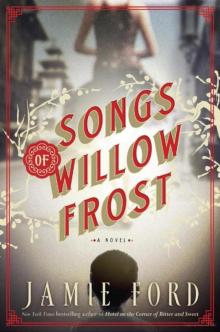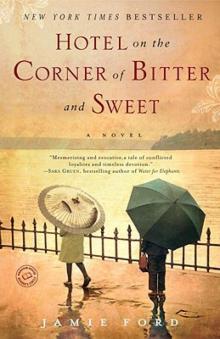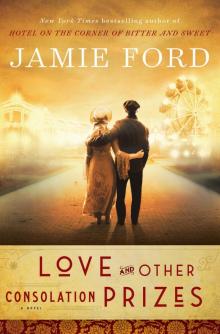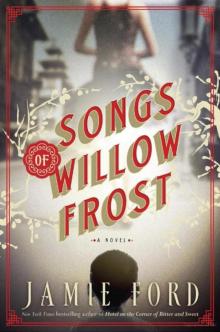- Home
- Jamie Ford
Love and Other Consolation Prizes Page 20
Love and Other Consolation Prizes Read online
Page 20
An old Japanese woman wandered by, collecting wet towels for the laundry and wiping down the bench seating near a row of wooden lockers and hand-painted advertisements for the Maneki restaurant and the Higo Variety Store. She did a double take when she saw the three of them soaking, likely more surprised by Maisie’s blond hair than by the three of them bathing together, but she said nothing.
“Hello there. Pleasant weather we’re having,” Ernest said. The girls laughed, but the woman’s expression remained unchanged as she continued to the boiler room and closed the door behind her.
Ernest imagined what would happen if Mrs. Irvine walked in and saw him now. He pictured her eyes widening, her jaw dropping as she clutched her garments.
Then he felt Fahn let go and slowly drift away. Maisie too. They smiled and floated, spreading out their arms and hands, their feet, their bodies occasionally touching his as he closed his eyes again.
“I can’t believe we’re doing this,” Maisie said softly, her voice a ripple on the steamy, glassy surface of the water. “What are you thinking, Ernest?”
He searched for words that could describe this moment, this strange, marvelous joy, filled with intoxicating nervousness and thrilling emotion. The warm ocean of happiness and contentment that washed over him seemed endless. He wished Maisie and Fahn could read his mind—and that it could always be like this.
On the breezy walk home, Ernest stopped near one of the blooming cherry trees and carved a large heart with the sharp end of his hairpin. Inside the heart, he inscribed three sets of initials, while the girls twirled amid the falling blossoms.
COMING OUT, GOING AWAY
(1910)
Ernest shoveled a heaping mound of coal into the great iron boiler beneath the Tenderloin, ensuring that there would be plenty of hot water for the Gibson girls’ morning baths, though soaking in the claw-foot tubs upstairs couldn’t compare to the bliss of skinny-dipping at the sento. He closed the groaning furnace door with a worn leather mitt and felt the searing, blinding heat slowly fade away. He grabbed his shirt and put it on, buttons pulling over his broadening chest.
Ernest cleared the coal chute, restocked the supply bin, and then cleaned himself up for breakfast. When he finally made his way to the servants’ dining room, Iris, Rose, and Violet were already there, enjoying a fresh pot of tea. He greeted the ladies and took his seat at the far end of the long table. He ate a hash of last night’s ham, corn, and creamed potatoes while poring over a wrinkled copy of The Seattle Star. There was an article about a working girl named Hazel Moore, who’d been arrested and was fighting back. Her series, “My Confession,” had become popular with the upstairs girls. Ernest skimmed her tale of woe, from rural farm girl to a budding actress in musical theater. She eventually became the mistress of a wealthy man. He was now serving time on McNeil Island while her fate remained unsettled, much like what had remained of Madam Flora’s memory.
But even those troublesome tales had become lost in the latest topic of the day.
He turned the page, and Rose read over his shoulder, “Astronomers in England say the tail of Halley’s Comet is millions of miles long and made of cyanogen and could kill every one of us when the Earth passes through that poisonous gas.” She gave him a look of wide-eyed worry as she pointed to the article. “If you ask me, it’s all an omen of something terrible.”
Violet rolled her eyes, while Iris said, “What you’re suggestionizing is preposterous. It’s just a big shooting star, dear, like the Daylight Comet we saw in January. Make a wish and be done with it. The real news, Rosie, is that you’re a ninny.”
Rose sputtered as she held up the newspaper. “Every time it reappears, terrible things happen. Look at England—their king is on his deathbed. And this lady, Madame de Thebes, says there will be flooding in Paris.” Rose put her hand on her hip and cocked her head as if that settled the argument.
Of all the maids, Rose had been the most caught up in the worldwide fervor about comets, spirits, and astrology. She’d gone to see Alexander: The Man Who Knows at the Pantages Theatre. She’d even bought a Ouija board and scared half the upstairs girls out of their wits until Miss Amber made her get rid of the parlor game.
As Fahn joined them at the table, Ernest listened to their bickering, imagining Madam Flora as their personal star, streaking across the sky in a fading trail of light.
It was their end of the world: Madam’s declining health and her declining capacity for joy, business sense, poise, and charm.
While Violet and Iris went on to discuss their duties for the day, and Rose and Fahn compared notes on the handsome patrons from the night before, Ernest wondered if they too had noticed that the hysterics had become more frequent. Did they hear the flustered chatter at night, the banging on the floor, the struggle by Miss Amber to keep Madam Flora in her room when she was out of her mind and going off like a church bell? Or the sullen way Maisie carried the burden of losing her mother, echoing the cycle of good and bad days? Instead, as if determinedly looking away from what was going on in their own house, everyone seemed to talk only about sensational stories of the latest race riots, Jack Johnson carrying on with a white woman, or aeroplanes and world’s records. Though also about the motorcar and the gifts that kept arriving.
“I still can’t believe that thing!” Rose said to no one in particular. “Most men send flowers or Swiss chocolates, or maybe silk scarves, but this fellow buys us a brand-new car. Too bad he didn’t just send cash!”
Ernest looked about the room and noticed the nervous glances.
“Louis Turnbull is nothing to worry about,” said Maisie. “That old fool wasn’t content with his slice and now he wants the whole pie. Let him take a good bite and see how Madam Flora tastes now. He’ll turn tail and run—the feckless coward.”
“And how is your big promotion going, lad?” Mrs. Blackwell shouted from the kitchen, snapping Ernest out of his wandering thoughts. “Madam always wanted a real coachman. And once Professor gets done teaching you how to operate that contraption, you can take us all out for Sunday jaunts on the regular. Oh, how I’d love to soak my bunions at Green Lake Park.”
“Bring your bathing suit and we’ll make a day of it,” Ernest promised.
The ladies laughed and Ernest smiled. Professor True had already given him three weeks’ worth of driving lessons. His most recent had been a starting, stopping, stalling, lurching journey in which they’d traveled a whole twelve blocks to J. Redelsheimer & Co., where he’d been fitted for a leather driving coat, butter-soft gloves, goggles, and a cap. He knew Madam Flora couldn’t afford it, but she had insisted.
He’d been told that when he passed his twelve-question driving test, he’d begin taking Madam Flora and Miss Amber to their numerous weekly doctor appointments all around the city.
Meanwhile some of the Gibson girls were less eager to start riding in the car. They’d read articles in respectable magazines regarding the fact that traveling at such high speeds—as fast as twenty miles per hour—might cause acute mental suffering, nervous excitement, and circulatory problems in women. Other articles questioned the propriety of a man and a woman traveling together in an automobile.
But as Maisie had said, “What does Madam Flora have to lose either way?” She’d laughed broadly and asked Ernest to start the car.
—
THAT DAY THE roads were bone dry and the sun was shining, so Miss Amber sent Ernest out with Professor True for another lesson—another battle, really. Ernest tenderly retarded the spark plug so he could start the thing, only to wrestle with the pedals and the gearbox, the throttle and the brake lever.
“And take our darling ragamuffin twins with you, while you’re at it,” Miss Amber had said. Ernest felt nervous but excited about finally taking them for a spin.
“Don’t think of us as passengers,” Maisie teased. “Think of us as victims.”
“Survivors,” Fahn said. “We’re safer here than on the sidewalk!”
They sat in the back
, laughing and crowing, but seemed more apprehensive than when they’d waited in line for the Fairy Gorge Tickler. They kept finding things inside the motorcar to hold on to, looking for ways to brace themselves.
“How do you know so much about driving, Professor?” Fahn asked as the musician cranked the starter rod. If he minded playing mechanic while still wearing his evening tuxedo, he didn’t show his displeasure.
The Professor shouted above the roar of the engine, “I don’t! But I know how to work an engine, baby doll. Spent a winter helping my brother operate an ice cutter back in the day, made from a repurposed motor. The rest…ah, we’ll keep figuring it out together.” He jumped into the front passenger seat next to Ernest and patted him on the back. “What’s the worst that can happen?”
Ernest tried not to think about the car turning turtle on the sidewalk, or crashing into a bus. He was more mature, at least, than some of the other chauffeurs on the road. Boys as young as eleven were being enlisted as drivers all over the city.
“When do I get a turn?” Maisie asked.
“Right about the time I run for president,” Professor True said. “You know Madam and Miss Amber: there are some things a proper woman just doesn’t do, and driving an automobile is one of ’em.”
Ernest refrained from noting the irony of things a proper woman at the Tenderloin doesn’t do.
“Well, when I get the vote,” Maisie argued, “I’m going to make sure women can drive anytime they want…”
“As fast as we want,” Fahn added.
“Why would you want to drive when you’ve got me as your chauffeur?” Ernest interrupted as he stepped on a pedal, lurching the roadster into high gear. Then the car stalled in the middle of the street as another car veered around them. “Don’t answer that.”
“Things are gonna change,” Maisie said. “You just wait and see…”
“Now you sound like Mrs. Irvine,” Ernest said as he started the car again and they motored up First Avenue, around the Bon Marché, Frederick & Nelson, and Knosher’s clothier. Then he pulled hard on the brake lever as he turned a corner and had to swerve to avoid hitting an oncoming trolley. Professor True held on to his hat while singing the melody of “The Longest Way ’Round Is the Sweetest Way Home.”
As Ernest straightened the wheel, Fahn wrapped her arms around his neck and sang the chorus into his ear, “Two young lovers strolled down by the stream, said the maid with a smile, as they crossed o’er the stile…”
“Keep it in one piece, son,” Professor True said as Ernest drifted one tire up onto the sidewalk and back down again. Fahn stopped singing and let go, laughing.
“Madam might need this thing,” Professor True added. “Sounds as though she and Miss Amber will be taking a cruise to San Francisco to see some special doctors—might be down there a few months, and this kind of newfangled medicine don’t come on the cheap. Money is tight without Madam Flora at her fighting best, so they’re talking about maybe selling this car to pay for the trip.”
Ernest was both surprised and relieved to hear someone finally speak frankly and openly about Madam Flora’s condition. He blew a spot of dust from the dashboard, disappointed at the thought of losing such an amazing new machine right when he was getting the hang of things. He wasn’t sure what to believe.
“When did you hear this?” Maisie asked. She held down the hem of her dress as the fabric blew in the wind. “Who told you that?”
“Miss Amber told me last night, Mayflower. I thought you knew.”
Before breakfast Ernest had overheard Mrs. Blackwell mention there’d be some kind of announcement tonight. He assumed the big news was another dinner party like the Victorian, rose-themed Valentine’s Day gala. Or the bawdy Easter egg hunt Madam Flora had celebrated upstairs. Though some of the servants had been murmuring about possible wage cuts or longer weekend hours.
Ernest slowed down and honked, tipping his hat to a group of ladies on the street who waved as they trundled across. Why send me out for driving lessons if they planned to sell the car? he wondered.
Then he felt Fahn’s hands on his shoulders again as she leaned forward and whispered, “This is my big chance, young Ernest.”
—
THAT AFTERNOON, AFTER lunch and their midday duties were attended to, Ernest sat with Maisie taking a break on his fire escape, sipping glasses of fresh, tart lemonade. They dangled their bare feet as they watched a steamship, probably loaded with millworkers and bindle punks, chugging toward Bainbridge Island beneath a trailing cloud of smoke. They counted the vessels in the mosquito fleet as well as the smaller boats, which shuttled downtowners to Alki Point and families to Luna Park.
Ernest stretched his back. The weather was unusually nice. The rains of March had been absent and the warm sunshine felt like a gift. Now that Maisie’s blond hair was longer, it fluttered in the breeze, and curls brushed Ernest’s face, tickling his cheek.
“Sorry,” she said as she tied her hair back with a piece of ribbon. “I’m not allowed to cut my hair, by order of Madam Flora and Miss Amber, all part of their conspiracy to make a lady out of me, the next grande dame. Like I’d want their jobs…”
As Ernest watched the silver-hulled Bainbridge ferry slowly turn against the tide and the breeze, he thought about Maisie and her quiet transformation. Gone were the dungarees, the suspenders, and the porkpie hats. Now she wore dresses and French makeup every day. But those weren’t the only changes he noticed. As a Christmas present, for instance, Madam Flora, in a moment of clarity (or madness), had given her little hummingbird private dance lessons with Anna Pavlova, a famous ballerina who was visiting the city. Maisie had turned her nose up at the gift, but shortly after the lesson Ernest had caught her practicing her pointe, more than once. She’d been attending elocution lessons with the other girls, lectures on politics and women’s suffrage, and had even studied the pros and cons of the latest temperance movements.
There was no doubt in Ernest’s mind that Madam Flora was preparing her daughter to one day become Madam Maisie. After all, the sons of doctors often followed their fathers into medicine, and the sons of accountants often one day added their signatures to their fathers’ ledgers. Why wouldn’t a daughter follow her wildly successful mother as a captain of late-night industry?
Ernest tried not to stare at the girl who could make his heart turn inside out merely by tying her hair up in a bow, just as much as whenever Fahn kissed him. Instead he appreciated the cloudless azure sky. It felt as though summer had come early and with the sun’s arrival, a promise of comfort, acceptance, and opportunity. He breathed a sigh of relief that anything seemed possible and every good thing seemed within his grasp.
“You know what Fahn is up to, don’t you?” Maisie asked.
Ernest sighed. “I have a pretty good idea.”
“She’s serious…” Maisie shook her head. “She’s with Madam Flora and Amber right now, trying to convince them to let her follow Jewel and become the next belle de Tenderloin. Why would she do such a stupid thing?”
Maisie kept talking, not waiting for a reply. “She has a great life. She gets to live here without really working here, if you know what I mean. She could grow up and manage any house—not just in the Garment District, but any house in the county. There’s always a position for an expert domestic, and even Miss Amber would give her a decent reference. She’s crazy to want to be turned out as just another working quiff.”
Ernest had never heard the word, but it was easy to partake of its meaning. He shook his head. “She thinks she’s selling herself, but she’s just giving herself away.”
Maisie nodded and then stopped abruptly. “You fancy her, don’t you?”
“It’s not that,” Ernest dodged. “Well, maybe a little. But it doesn’t matter, does it? She has other plans.”
Maisie looked disappointed, a tad jealous, then they heard shouting from the alley, where a group of teenage boys had gathered, heckling Maisie about showing off her legs. They hurled obscenities a
s she tucked the fabric of her long dress beneath her.
“Hey, pretty bird!” one of the boys shouted. “I thought you whores weren’t supposed to come out in the daytime.”
The other boys laughed and joined in. One boy even unbuttoned his trousers and dropped them to his ankles.
Maisie razzed the boys back, but Ernest could see her face flush as tears began to well up in the corners of her blue eyes. He took one last sip of his lemonade and then emptied the rest onto the heads of the young men below. They cursed and shouted even louder as they wiped their arms and faces with handkerchiefs.
“You’re being too nice,” Maisie said as she took aim and then dropped her entire glass, contents and all. She smiled as the glass shattered atop the head of the pantless boy with a satisfying popping sound, spraying lemonade and broken shards in all directions.
Maisie stood up and wiped her tears. “Let’s go inside.”
“To see about the announcement?”
“No,” Maisie said. “To see what else we can find to drop on their lousy heads.”
Ernest smiled. “Maybe Professor can help us with the piano.”
—
AFTER THE SERVANTS ate dinner that night, Miss Amber gathered the residents of the Tenderloin in the grand parlor. They were all there—the upstairs ladies as well as the working staff and Professor True—for the announcement everyone had been murmuring about.
Ernest sat on a plush purple chaise between Fahn and Maisie, trying not to tap his feet on the wooden floor while Miss Amber paced back and forth like a reluctant field marshal in a violet wig, about to address her ragtag, misfit army before they fixed bayonets and charged into battle.

 Songs of Willow Frost
Songs of Willow Frost Hotel on the Corner of Bitter and Sweet
Hotel on the Corner of Bitter and Sweet Love and Other Consolation Prizes
Love and Other Consolation Prizes Songs of Willow Frost: A Novel
Songs of Willow Frost: A Novel